You are here
Home ›A Beginner's Guide to Doctor Who - Part 2
FTC Statement: Reviewers are frequently provided by the publisher/production company with a copy of the material being reviewed.The opinions published are solely those of the respective reviewers and may not reflect the opinions of CriticalBlast.com or its management.
As an Amazon Associate, we earn from qualifying purchases. (This is a legal requirement, as apparently some sites advertise for Amazon for free. Yes, that's sarcasm.)
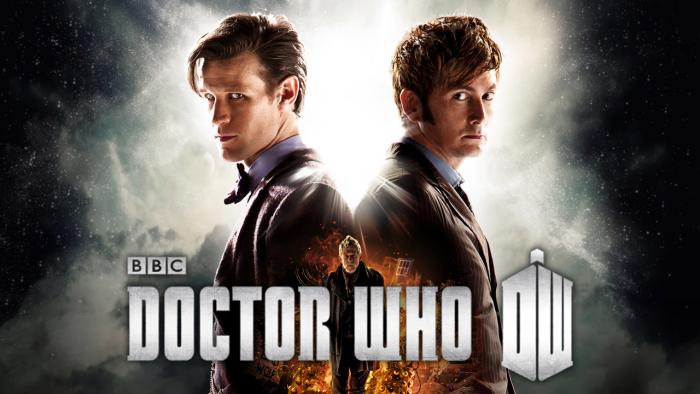
Since there have been 13 different Doctors and 50+ years of Doctor Who, it can be a bit overwhelming. So, we’re going to give some quick information about each incarnation of the Doctor and some of the best episodes starring each Doctor. We decided to start with the “modern Doctors,” since all of that is currently on Netflix and easily accessible.
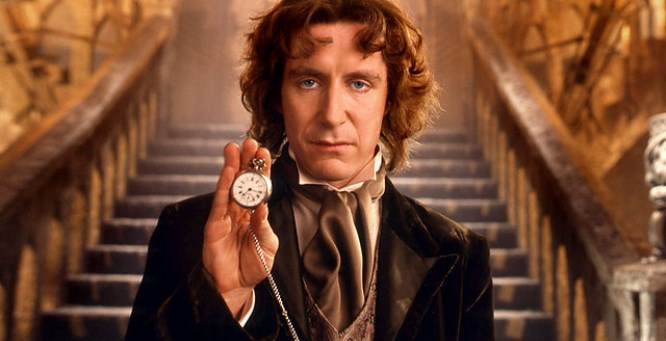 The Eighth Doctor (Paul McGann)
The Eighth Doctor (Paul McGann)
It is a shame that the Doctor Who movie was so awful. Paul McGann was so good in the role. He had a tremendous amount of charm and when you look at it now, he served as the perfect bridge between the more alien Doctors of the past and the more human modern Doctors. In fact, this version of the Doctor even claimed to have human lineage. Though it is assumed now that he was either lying or just confused after the regeneration.
One thing that is really interesting about the Eighth Doctor is that even though he only appeared in one movie (and later on, in a short as part of Doctor Who’s 50th Anniversary), he might have more stories than any other version of The Doctor. When the movie aired, BBC also launched a line of novels featuring The Eighth Doctor that went on for years. Also Paul McGann has done many audio books playing the Doctor as part of Big Finish’s Doctor Who line. He continues to do those in fact.
As for the movie itself, it was made in conjunction with Fox and you can see the American influences. Big gaudy effects and Eric Roberts as the most ridiculous version of the Master imaginable. Honestly, it is only worth watching to get a sense of where Doctor Who was and why it took so long for it to get back on the air. Though Paul McGann is great, this was an awful vehicle for him.
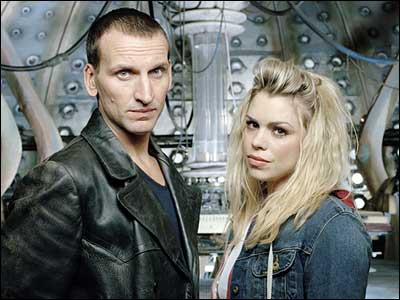 The Ninth Doctor (Chris Eccleston)
The Ninth Doctor (Chris Eccleston)
The Ninth Doctor was only around for one season, but it was a memorable one. After the show had been off the air for more than 15 years, they really needed to hit exactly the right tone for the character. Someone who would appeal to new audience, but not alienate the fans of the original. Chris Eccleston ended up being a perfect choice. He managed to give the Doctor more of an edge than we had been used to, while still being a kind and good man. He was joined by pop star Billie Piper as Rose Tyler. The two had tremendous chemistry, especially with the great stories Russel T. Davies gave them to work with.
Best of Nine:
"Rose" - Watching it now and out of context, Rose is a bit campy. The Doctor and Rose meet and end up having to fight living plastic mannequins led by a massive blob called the Nestene Consciousness. But the tone of this episode was the perfect way to bring the Doctor back. Lots of action, plenty of great character moments, including the Doctor explaining how he feels the rotation of the Earth. Pretty much from this scene, I was a Doctor Who fan:
"The Parting of Ways" - Just as Chris Eccleston really seemed to be finding his footing as The Doctor, he was abruptly killed off to bring in David Tennant. Part of me would have loved to see Chris Eccleston does a lot more with the character, but this actually was the perfect way to end the first season. It helped the new reader understand that Doctor Who is always changing, and you should learn to expect anything...even the death of the main character. His last episode, especially his regeneration sequence, are some of my favorite moments in Doctor Who. When he tells Rose, “Before I go, Rose, you were fantastic...and you know? So was I!” I tear up every time. The Doctor’s life as he knows it is coming to an end, but he still wants to make sure he leaves Rose with a smile.
"The Empty Child/The Doctor Dances" - These are the first Doctor Who episodes written by Stephen Moffat who would later become Doctor Who’s show runner. They are probably the scariest episodes in the first season, with the creepy kids in gas masks walking around asking “Are You My Mommy?” These episodes also introduced Captain Jack Harkness, who is one of my favorite Doctor Who characters (and star of the spinoff series TORCHWOOD).
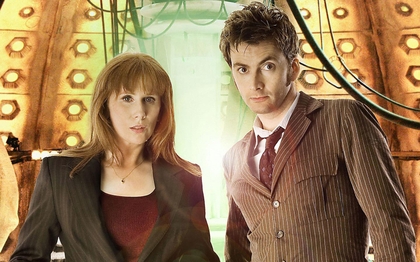 The Tenth Doctor (David Tennant)
The Tenth Doctor (David Tennant)
While fans of the classic DOCTOR WHO might argue, David Tennant is basically the most popular version of the Doctor. David Tennant (even outside of the role) has a ton of charm and charisma. In fact, of the actors who played the Doctor, he’s the only one I got out of my way to watch everything he has done since. If you get a chance to see his work in BROADCHURCH or THE ESCAPE ARTIST, you have to do so. AND HE’S NOT EVEN MY FAVORITE VERSION OF THE DOCTOR! But I still have nothing but love and respect for David Tennant.
The Tenth Doctor is probably the most human version of the Doctor. He had romantic ties to his companion (something we have only seen once before with the Eighth Doctor, and that was only real brief). For the most part, this version of the Doctor was playful and seemed to embrace life with a great amount of joy. BUT, when he needed to, he could turn dark and disturbing in a very believable fashion. One episode refers to the Fury of the Time Lords, and David Tennant portrayed that beautifully.
Of the modern Doctors, David Tennant had the most different companions. For his first season, he inherited Rose Tyler from the Ninth Doctor. And they had one of the great fandom romances of all time. At the end of the season, Rose is stuck in another dimension apart from the Doctor forever...and there are a lot of fans who never got over that.
In his season season, Martha Jones (played by Freema Agyeman) was his companion. I actually thought she was very good in the role, BUT, it was a mistake to make her have a crush on the Doctor. She often felt like Rose retread. I think she did much better with the character in her return appearances for season 4 and the spin-off Torchwood.
For his last full season, Catherine Tate returned to play Donna Noble (Donna had first appeared in the Christmas special between seasons 2 and 3). Donna might have been my favorite modern companion. She was not a cute 20-something with a crush on the Doctor. She was someone who would stand up against the Doctor when she disagreed with him, and we got to watch her develop over the course of the season into someone who was far more confident and secure about who she was.
Best episodes:
“Blink” - I know, I know. It is horribly cliche to include this episode. Blink tops most people’s list. In fact, a few years ago, Doctor Who Magazine did a survey and fans voted it the second most popular Doctor Who episode of all time. And it is probably deserving of the top spot! Not only did it introduce one of the scariest and most memorable Doctor Who monsters (the Weeping Angels), but the episode itself is a clever story. The Doctor isn’t really in most of the episode, he communicates with the other characters using a DVD Easter Egg. It also stars Carey Mulligan, who was responsible for one of my all time favorite Colbert Report sketches.
This episode tends to be a great way to introduce new viewers to Doctor Who.
“Love and Monsters” - A lot of people HATE this episode, but it is one of my personal favorites. Again, this is another episode where the Doctor has a fairly small role. For some reason, I always seem to gravitate towards those episodes. In this episode, we meet a small group obsessed with The Doctor. The main villain is kind of lame, he was actually designed by a kid who won a contest. But, I thought this episode has a lot of heart and charm to it.
“Fires of Pompeii” - Even before Peter Capaldi was announced as The Doctor, I watched this episode of Doctor Who several times. I can’t quite put my finger on what it is, but it has always been a favorite. Lots of great funny moments, especially the way the TARDIS’s translator keeps get confused whenever Donna tries using Italian words. But there is also a lot of serious questions here about what The Doctor can and cannot do. And perhaps more importantly, what he SHOULD or SHOULD NOT do. The Doctor is constantly making tough choices. As I mentioned earlier, this episode also featured Peter Capaldi long before he would play The Doctor, but it also featured Karen Gillan long before she would play Amy Pond. This actually is a pretty common occurrence in Doctor Who. Actors appear in a minor role, and end up coming back later on to play a bigger role.
“Voyage of the Damned” - Doctor Who as an action movie! This actually was the first episode of Doctor Who that I watched as soon as it aired. I had caught up on the earlier seasons through Netflix, and I got to watch this massive, epic episode on Christmas when it aired (admittingly, I had to bootleg it. This was before BBC started airing Doctor Who in America the same time as they aired them in Britain). Since then, it’s become a Christmas night tradition in my house to watch Doctor Who right after the kids go to bed. I will admit that most of the Christmas specials have been nowhere near as good as Voyage of the Damned. Two more things about this episode. I have always been real sad about Astrid getting killed. She would have been a great companion (I love Kylie Minogue). And this scene is awesome:
“Waters of Mars” - Waters of Mars is a great episode, but the ending really stands out for me. Over the last few episodes, the Doctor is certain that he’s heading towards an inevitable death. He ends up on a doomed station on Mars, knowing that this place is destined to be destroyed by a monster that uses water as it’s weapon of choice. But The Doctor decides to give a big F-U to fate and intentionally saves someone that he knows is supposed to die. He declares himself above the laws of time and space. He’s the last Time Lord left standing, so who is going to stop him. The women he rescued is dismayed by his actions and arrogance, especially when he declares himself Time Lord Victorious. She kills herself to fix the timeline. The Doctor realizes what he has become, and realizes that maybe it really is about time for him to start winding down this incarnation. I also love that the base is called Bowie Base One. Life on Mars is one of my favorite songs.
“Human Nature/Family of Blood” - In these episodes, The Doctor tries to avoid a dangerous enemy by turning himself human and wiping out all his memories. The Doctor is able to live a normal life as a school teacher, and finds happiness. Unfortunately, the Family of Blood refuse to let him be. They quickly find out that it’s never a good idea to piss off a Time Lord. His revenge on this is just plain terrifying:
What I really loved about these episodes is that it made you really question what we think we know about the Doctor. We know that he had a family once...is there a big part of him that would just like to settle down and live a normal life again? This episode also sets up a major reveal at the end of the season in a very clever way.
“Silence In the Library/Forest of the Dead” - This episode introduces the mysterious River Song. Almost immediately, it is clear that this character has close ties to the Doctor, but it’s not quite certain what they are...not even to The Doctor, since this is the first time he is meeting her (time travel is wacky that way). River Song’s story would be a major part of the Eleventh Doctor’s Story a few years later. I also loved the villains in this one. Living shadows that consume human flesh. Definitely among the scariest creatures we’ve seen in Doctor Who. Stephen Moffat wrote these episodes, and he seems to always create great monsters.
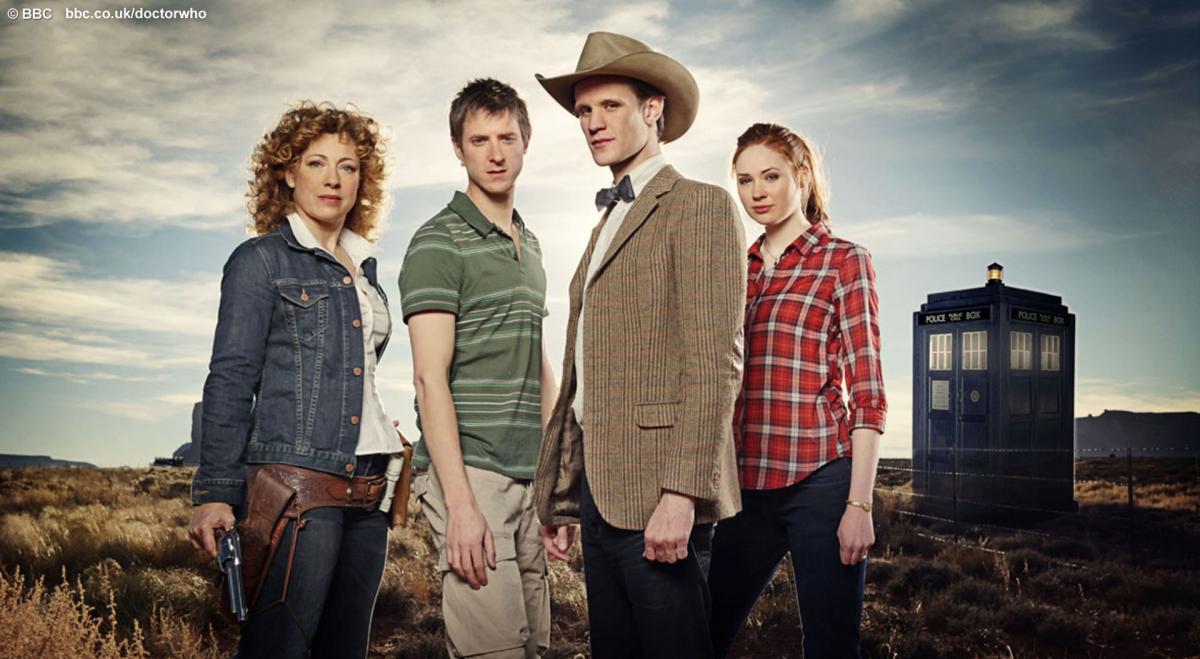 The Eleventh Doctor (Matt Smith)
The Eleventh Doctor (Matt Smith)
Matt Smith had a very difficult task in taking over from David Tennant, arguably the most popular actor to have played the Doctor. Matt Smith was a relative unknown, and only 26 years old when he was cast for the role. But, he definitely handled it very well. While the Tenth Doctor was very human, the Eleventh Doctor played up the alienness of the character. A lot of the humor of the Eleventh Doctor came from him not understanding normal human things, especially when it came to romance.
But the Eleventh Doctor also showed a lot of depth, with the character having some lengthy monologues about who The Doctor is and what he means to the universe. For such a young actor, Matt Smith showed he was more than up for the challenge.
The start of the Eleventh Doctor’s run was also a dramatic shift in direction for Doctor Who. Russell T Davies had left the show, and Stephen Moffat took over. Moffat seemed determined to add a lot more pathos to the character, especially in how he used the companions. Amy Pond (played by Karen Gillan) and her fiance (later husband) Rory Williams (played by Arthur Darvill) were the companions for most of Matt Smith’s run. A lot of the first season seemed to be about Amy trying to decide who she really loved...The Doctor or Rory.
We also got a lot more insight into River Song, a character introduced during David Tennant’s run who has a strong connection to the Doctor (SPOILERS!). This would play into the time-twisting stories that Stephen Moffat seems to enjoy writing quite a bit.
Best Episodes:
“The Eleventh Hour” - Normally, I don’t like the first episode of any new Doctor. They seem to be spending so much time trying to make the viewer realize “this is the same guy you have always loved,” that the story gets lost in the process. Also, because of the strain of regeneration, quite a few first episodes of a new Doctor involve the Doctor out of comission for a good chunk of the story. Off the top of my head, this happened for the third Doctor, Fifth Doctor, and Tenth Doctor. But what made The Eleventh Hour so different was that not only were we introducing a new Doctor, but also a new showrunner. In this episode, Moffat does an excellent job making the show his own. We see the connections to past versions of the Doctor, but at the same time, it’s very clear this is going to take the character in a new direction too. They squeezed a lot in this hour, and it worked so well.
“Vincent and the Doctor” - Doctor Who can be a little inconsistent about whether or not the Doctor can change the time line. The show uses a lot of excuses like locked time to explain why the Doctor can’t just fix every problem by using time travel. This episode involves the Doctor and Amy meeting Vincent Van Gogh (played brilliant by Tony Curran). Van Gogh’s unique way of seeing the world allows him to see a monster than no one else can see. The Doctor helps defeat the alien, but Amy is dismayed that her new friend Vincent would end up killing himself without knowing the impact his art has had on the world. She convinces the Doctor to take Van Gogh to the future.
Van Gogh is touched...but in the end, he still ends up killing himself, having painted only one new painting...a sunflower for Amy. This leads to one of the most beautiful moments in Doctor Who:
“Pandorica Opens/Big Bang” - The end of the Eleventh Doctor’s first season ends up basically playing out like a magic trick. All of the Doctor’s enemies have been conspiring to put the Doctor in an inescapable prison. The reason is because they believe the Doctor is going to be responsible for destroying all of time and space when his TARDIS explodes. Moffat seems to have written himself into a corner with no way out. And the last episode shows how cleverly he has been laying out answers the entire season. It uses time travel in some creative ways, but it’s done so carefully it never quite feels like a cheat. That is a tough balance to maintain. It would be so easy for the Doctor to solve all his problems this way, but it feels special and unique here, and makes perfect sense. I also love the wedding scene at the end.
“A Good Man Goes to War” - I actually was surprised that I included this episode on my list. I did enjoy the Eleventh Doctor’s second season, but it did feel like a lot of the “tricks” used in the story felt like lesser versions of things we saw in his first season. A Good Man Goes to War is basically the midpoint of the story. Amy has been kidnapped, and the Doctor gathers up his allies (including many we’ve never met before) to rescue her. This episode also goes us some answers on who the mysterious River Song is. There are just a lot of terrific moments in this episode, where we see how dangerous the Doctor can be when his friends are put in harm’s way.
“Day of the Doctor” - This is the 50th Anniversary episode of Doctor Who. We get the Tenth and Eleventh Doctor’s teaming up with a previously unknown incarnation of the Doctor called The War Doctor (played by John Hurt). The episode basically takes place on the day The War Doctor decided that the only way to stop the Last Great Time War was by destroying Time Lords and Daleks alike. The weapon he is going to use has a conscience, and forces him to reconsider his path. In the process, he ends up meeting the future incarnations of himself and have an adventure with them against shapeshifting Zygons. This episode is just a gift for Doctor Who fans. Lots of nods to Doctor Who’s long history. And there are just so many funny moments (especially involving who the different incarnations of the Doctor see each other), and the end promises a huge shift in the direction of the series...though admittingly, the series has not quite kept that promise yet. This episode also features a brilliant cameo from Tom Baker.
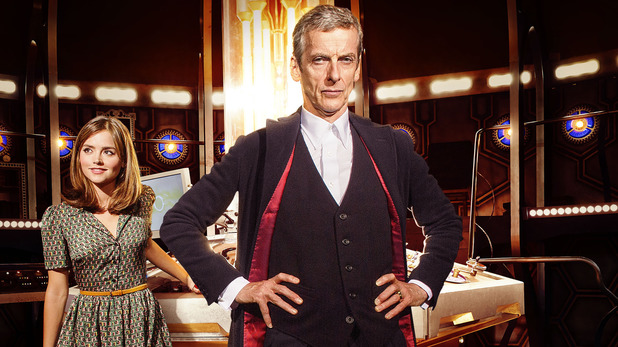 The Twelfth Doctor (Peter Capaldi)
The Twelfth Doctor (Peter Capaldi)
Oddly enough, I am writing this exactly two years to the date that Peter Capaldi was announced at the new star of Doctor Who. The decision to go with an older actor surprised a lot of viewers (read that as “young girls who loved David Tennant and Matt Smith). But Capaldi might be the most high profile actor to have ever taken on the role. He’s had a long a distinguished career, and even won an Academy Award for Best Short Film for writing and directing “Franz Kafka's It's a Wonderful Life.”
With Capaldi, some huge changes were made to the character. An older actor came with “older personality.” The Twelfth Doctor is a bit cranky, constantly making snide remarks about his companion. He also isn’t quite certain whether or not he’s still a good man, a recurring theme in the narrative. But, he’s still basically the same character. Constantly funny, and not always intentionally.
Capaldi was joined by Jenna Coleman as Clara Oswald. Clara first appeared towards the end of Matt Smith’s run, and has the distinction of being the “Ultimate Mary Sue.” Stephen Moffat has in many ways made her the most important companion ever, even suggesting that she went through the time stream and has helped the Doctor in many of his biggest decisions. Normally, this would make a character really annoying (and many fans do feel that way about her), but Coleman has brought a lot of fun to this character and her chemistry with Capaldi is terrific.
“Listen” - This episode answers the question “What does the Doctor get up to when he’s bored?” The Doctor comes up with the idea that there is some kind of creature who has perfected the ability to hide and is stalking him. The Doctor and Clara travel through Clara’s timeline to try and find this elusive character. This is shown in parallel to Clara’s attempts to try and live a normal life, including having a boyfriend. This episode is creepy at times, but also very thoughtful. It also gives us a hint on how the Doctor ends up turning out the way he is now. I also like that we don’t get a lot of answers to what’s going on. Just a ton of questions.
“Mummy on the Orient Express” - To me, this episode really showed how different this version of the Doctor is. He seemed perfectly willing to sacrifice lives in order to save others, and his detachment was borderline disturbing at times. Clara had called him on that at the end of the last episode, and Jenna Coleman’s performance in this episode, suggesting her “addiction” was brilliantly done. The Doctor refers to her sad smile, and that described her expression perfectly. I also loved the supporting cast for this one. All the characters seemed to have deep back stories and story lines, and it definitely gave the story very high stakes as each of them is killed off one by one. I especially liked Frank Skinner as the train’s maintenance man, Perkins. He had some great scenes playing off Peter Capaldi. I was kind of disappointed in the end when the Doctor offered him a job on the TARDIS, but Perkins declines him. Perkins seems like someone who would match up really well with this version of the Doctor, and I hope his story isn’t over yet.
“Flatline” - Both Flatline and Mummy were written by Jamie Mathieson, a newcomer to Doctor Who. Mathieson seems to have mastered the perfect balance between scary and the inherent weirdness that a good episode of Doctor Who has. The Boneless were damn creepy villains. Whether they were sliding across the ground and walls, or they were shambling about as pseudo 3d images, they really created a disturbing atmosphere for this episode. This episode has the Doctor stuck in the TARDIS leaving Clara to investigate on her own. Like Blink and Turn Left, some of the strongest episodes of Doctor Who have been when the Doctor takes on a much smaller role, and this episode was no exception.
“Dark Water/Death in Heaven” - Moffat’s finales can be a bit clunky at times, but I really enjoyed the way the story came together here. In earlier episodes, I was really critical of Clara’s relationship with fellow teacher Danny Pink. I don’t like when Doctor Who gets tied down to relationship drama, but Danny’s death to start off the season finale came as a huge shock and set off a crazy sequence of events, including the revelation that The Master has returned...but this time as a woman. There are just so many strong character moments throughout these episodes, including Clara betraying the Doctor in the hope of forcing him to bring Danny back to life. Everything works so well, including a nice callback to the late Nicholas Courtney as Brigadier Sir Alistair Gordon Lethbridge-Stewart. The end of this episode served as a very fitting tribute to this Doctor Who mainstay.


